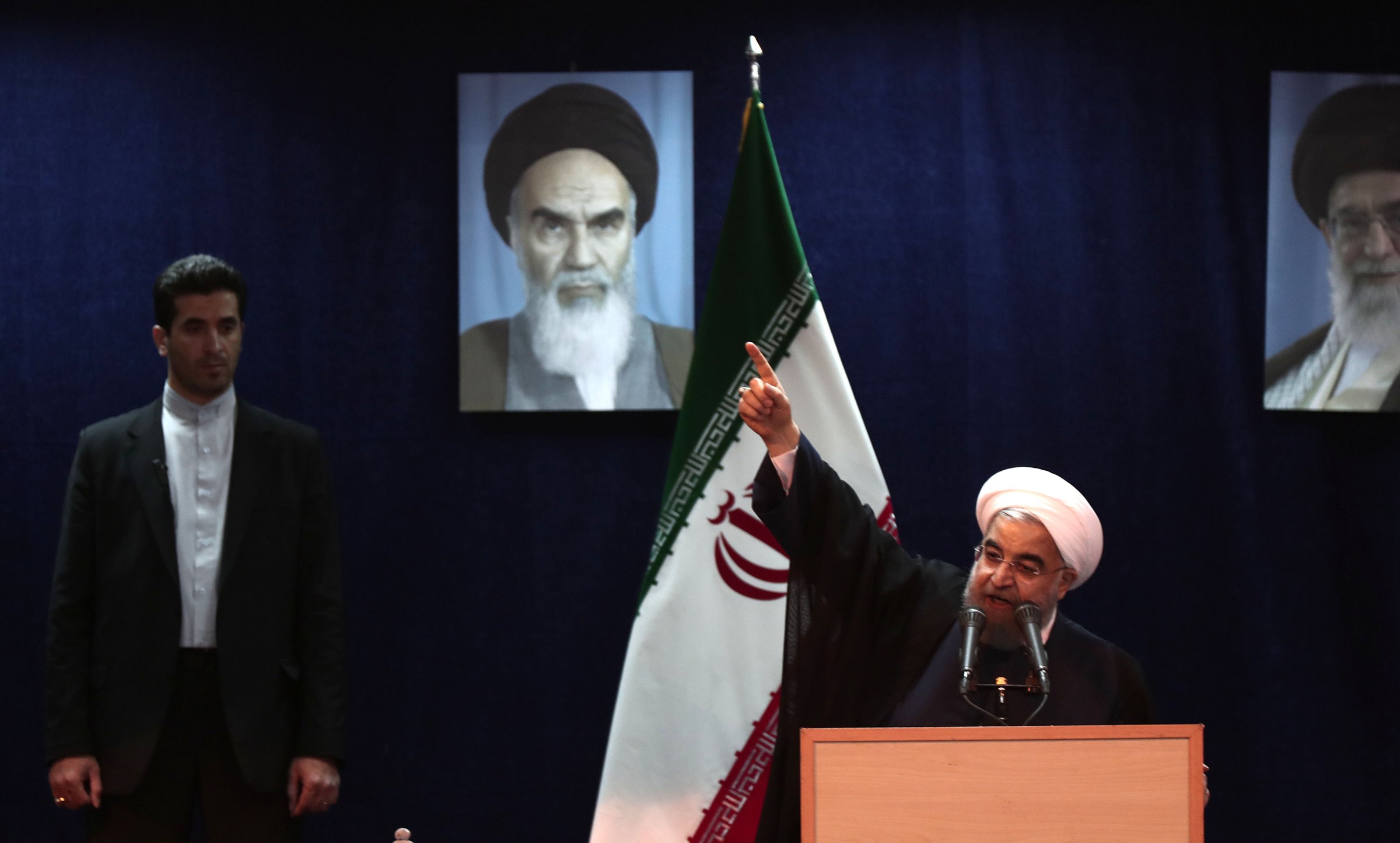
Iranians are set to vote for a president on Friday after a campaign season that has bruised each of the major candidates, while not exactly flattering the Islamic Republic itself.
Incumbent President Hassan Rouhani has been pummeled by hardliners, who blame him for economic hardships that have persisted despite the nuclear deal Rouhani championed as key to ending the country’s international isolation. The portrait of Iranian life under Rouhani sketched by conservative frontrunner Ebrahim Raisi, a longtime jurist and prosecutor, has been grim indeed. Fellow conservative and Tehran mayor Mohammad Ghalibaf echoed this theme before dropping out of the race on May 15 in order to avoid bleeding votes from Raisi.
In decrying rampant corruption and cronyism in Rouhani’s administration, and the plight of the working class, the conservatives are using the same charges leveled by every opposition group for decades, in the name of a revolution that came to power not only in the name of religion but of ordinary people who harked to the calls for social justice embedded in Islam. But this time there has been a strain of Western-style populism, too — Ghalibaf, a former Revolutionary Guards commander and national chief of police, took a page from the Occupy Wall Street movement, saying Iran’s elite 4% are like leeches sucking the blood of the other 96%.
Rouhani, meanwhile, champions the social freedoms and human rights issues that hardliners long have muffled in the name of revolutionary zeal. Although he is a product of the establishment himself as a former chief of Iran’s Supreme National Security Council, Rouhani was educated abroad, earning a PhD from Glasgow Caledonian University, and has been unique among first generation revolutionary statesmen in his relatively positive outlook towards the West.
As head of the nuclear negotiating team — a position he held until 2005 — he won the moniker of the Diplomat Sheikh, and won a surprise landslide in 2013 as a moderate. This year Rouhani has been leading in pre-election polls, but to boost his chances, the reformist candidate Eshagh Jahangiri is set to follow Ghalibaf in bowing out, and leave voters the clear choice between Raisi and Rouhani.
Each of the major candidates appears vulnerable. Raisi has never before stood for public office. Though his current job is as custodian of an immensely wealthy Shi’ite charity, he is being attacked for his past: In 1988, thousands of Iranians were executed after being swiftly condemned by a special tribunal on which Raisi served.
Uncertainties abound, both at home and abroad. U.S. President Donald Trump has left the nuclear deal in place, despite campaign vows to scrap it, but has also ratcheted up rhetoric against Iran and moved to restore ties with Iran’s main rival, Saudi Arabia, which President Obama was content to let sag. Iran’s military and intelligence assets are stretched thin, fighting expensive wars in Syria and Yemen.
Friday’s vote is also the first since the 1979 revolution that will not feature Ali Akbar Hashemi Rafsanjani, either as a candidate or wielding his influence behind the scenes. A onetime kingmaker known as “The Shark,” Rafsanjani, who died in January, had served as a counterweight to Supreme Leader Ali Khamenei, who holds the ultimate authority in Iran, above the elected government.
There have been signs of public unrest even before the vote. Though the nuclear deal freed Iran from international sanctions and immediately siphoned billions of dollars in previously frozen assets into the economy, the lot of ordinary people has not improved. Whether they blame Rouhani for their plight or the hardline architects of the system, any protests after the vote will surely not be limited to the middle-class Iranians who marched silently in 2009, after the contested election that returned Mahmoud Ahmedinejad to office. Ahmedinejad filed to run again, but was rejected by the unelected overseers who decide who will appear on the ballot.
The presidency is a tough job. Every living Iranian who has held the office ended up as a political pariah. The only exception is Khamenei, who after serving from 1981 – 1989, became Supreme Leader.
More Must-Reads from TIME
- Why Trump’s Message Worked on Latino Men
- What Trump’s Win Could Mean for Housing
- The 100 Must-Read Books of 2024
- Sleep Doctors Share the 1 Tip That’s Changed Their Lives
- Column: Let’s Bring Back Romance
- What It’s Like to Have Long COVID As a Kid
- FX’s Say Nothing Is the Must-Watch Political Thriller of 2024
- Merle Bombardieri Is Helping People Make the Baby Decision
Contact us at letters@time.com